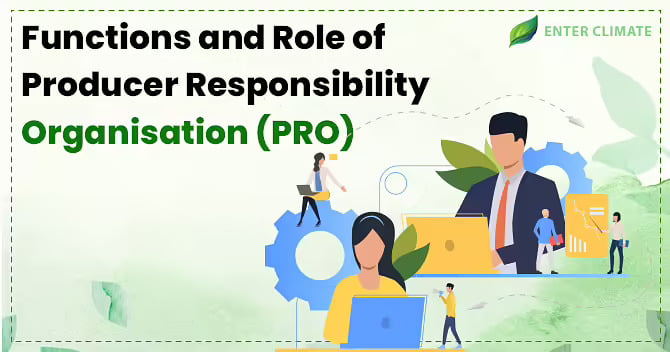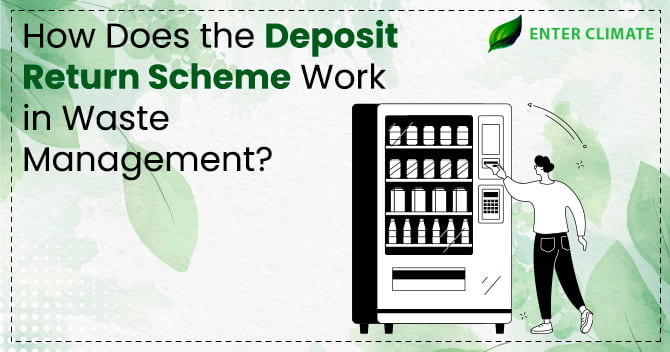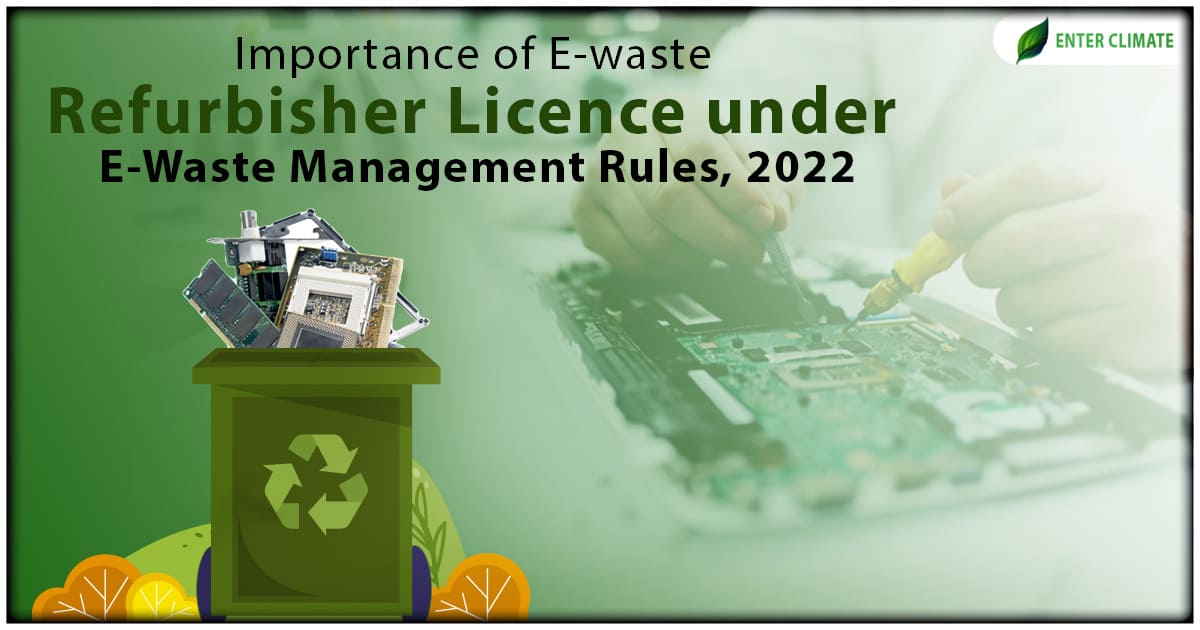Functions and Role of Producer Responsibility Organisation (PRO)
 09 Aug, 2022
09 Aug, 2022 
PRO or Producer Responsibility Organisation is defined as the enterprise that is delegated with the Producer’s responsibility to fulfill their Extended Producers’ Responsibility pertaining to collection, proper channelization, and management of E-Waste under the provisions of E-Waste Management Rules. As per Rule 3(dd) of E-Waste (Management) Rules, “PRO” means a professional enterprise authorized or hired collectively or individually by producers’ manufacturers, which can take liability for the collection and transportation of E-Waste generated from the “end-of-life” of their products to ensure environmentally sustainable management of such e-waste.”
It was recorded that by the end of May 2020, India is estimated to have 34 producer responsibility organizations (PRO) registered under the specified rules, with the details accessible in the public domain on the online portal of the Central Pollution Control Board.
Producers Responsibility Organisation can execute Extended Producers Responsibility through different models:-
- Producers Responsibility Organisation as a state-run institution/ Authority
- Producers’ Responsibility Organisations a Private Organization
- Producers Responsibility Organisation as a non-profit Corporation
Nevertheless, the different models of Producers Responsibility Organisationdo not impact the amount or proportion of WEEE (Waste Electrical and Electronic Equipment)[1] to meet the obligations delegated to the producers by the state pollution control board.
Functions of Producer Responsibility Organisation
The most critical functions of producers’ responsibility organization involve:-
- Executing a proper and sustainable collection approach for competently and effectively collecting waste.
- The producer’s primary duty is to attain the specified targets set up by the state pollution control board/Pollution Control Committee for producers to achieve Extended Producers Responsibility.
- Applying the policy of buyback waste and taking it back properly
- Handling and guaranteeing the environmentally friendly way of dismantling and recycling the waste collected
- Managing the documents and logistics
- Assist the producers with filing annual/quarterly returns per stipulated provisions.
- The function of the producer’s responsibility organisation also includes delivering an effective EPR action plan as stipulated by the guidelines provided by CPCB.
- Organizing frequent programs to create general awareness concerning the collection and channelization of waste among producers/Consumers or bulk consumers.
- The Producers Responsibility Organisation set up collection centers. According to the guidelines issued by the Central Pollution Control Board, this may require the institution of the collection to go downs or the operation of warehouses.
- Responsibility concerning traceability of e-waste gathered and channeled and the discarding of processed waste and end-of-life plastic garbage.
- In addition to these, PRO also needs the capability to handle garbage, including collection, storage, and information on the recyclers it has contracts with.
Role of Producer Responsibility Organisation
Role of Producer Responsibility Organisation include:-
- Establishing collection Points: – The primary role of the Producer Responsibility Organisation is to collect Waste, whether plastic waste or E-Waste, from various sources, including Retail Consumers, Retail traders, Bulk Consumers, Service centers and Kabadiwala. These also include setting up collection drives or exchange points for consumers. Once the waste is collected, it is transported to the proper channels in an environmentally sustainable way.
- Dismantling and Recycling: Once the Waste Electrical and Electronic Equipment is collected and it is transported to the Authorised Dismantler and recyclers in an environmentally sound way who have experience in managing the waste, whether plastic or EEE (Electrical and Electronic Equipment).
- Transportation: Another role of the Producers Responsibility Organisation includes setting up a proper channelization system for environmentally sound transport of waste from one channel to another to ensure proper management of waste.
- Assisting in EPR Plans: As per the guidelines provided by the Central Pollution Control Board regarding the Proper implementation of E-Waste Management Rules, the producers are responsible for submitting the Extended Producer Responsibility action plan mandatorily to the concerned authority. But the producers are also provided relief in the form that they can take assistance from the Producers’ Responsibility Organisation in filing for Action Plan with information on EPR targets.
- Assisting in the quarterly and annual reports: Similar to the case of EPR Plans, it is mandatory for PIBOs (Producers’/Importer/Brand Owners) to file for Quarterly and annual for which they can take aid from a third party of Producers’ Responsibility Organisation. The PRO is also involved in designing and formulating the report that is to be submitted to Central Pollution Control Board.
- Completing Collection Targets: EPR targets are set up by authorities for PIBOs (Producers’/Importer/Brand Owners), for which, again, they can take help from the Producer’s Responsibility Organisation for formulation and strategizing techniques for proper collection of waste as mandated by the Central Pollution Control Board.
- Spreading Awareness: Another significant role of the Producers Responsibility Organisation includes generating awareness among People, especially Consumers and Waste generators. They are required to promote:-
- Segregation of waste at source
- Educating them about different types of waste
- Promoting Sustainable practices
- Promoting sustainable management of waste by bulk consumers.
- Aiding PIBOs in innovation: When maintaining complete statistics and data on waste management, the Producers’ Responsibility Organisation help the PIBOs (Producers’/Importer/Brand Owners) innovate and design product with better life cycle and eco-friendly.
Procedure for Authorization of Producers’ Responsibility Organization
Even though mentioned under both Plastic Waste (Management) Rules and E-Waste (Management), the producers’ responsibility organisation, the authorization of PRO is only authorized under E-Waste rules after 2019 as per the notification published by Central Pollution Control Board. As Per the latest notification of CPCB, the registration of PRO under Plastic Waste (Management) Rules is not mandatory.
The Process for Authorization of Producers’ Responsibility organisation, as specified by the rules, includes:-
- Filing the application for registration to the Central Pollution Control Board. The application involves:-
- Establishment name and complete address with contact details including Phone number, E-Mails etc.
- Category of Waste Electrical and Electronic Equipment (EEE)projected to be controlled
- Name of the ApprovedPerson with the address and contact details
- Specifics of the stakeholders like dismantlers, recyclers or other channel partners
- The capacity of PRO for collection, storage and transportation of the waste, as well as information on the capacity of the channel partners
- District/State Covered
- Success stories
- Any other information volunteered by PRO
- PAN and GST numbers
- Details of the organizational structure
- Specifics on collection mechanism, website and toll-free number
- Once the application is completed and submitted with the required documents, the central pollution control board carry out an examination to evaluate the capability and competencies of the enterprise to control e-waste collection, Storing, transportation, dismantling, recycling, as well as its ability to carry out an awareness campaign to educate proper channelization of waste.
- Following the scrutiny, the report is made for assessment based on which, if the CPCB is content, awards the authorization/registration to PRO for which the time limit of 60 days from the receipt of complete application is provided.
- In case of issue or incomplete application, the Central Pollution Control Board should reply within 25 days where the specification of the issue is to be provided to the applicant.
- The registration/recognition of Producers’ responsibility organization should be applicable for five years.
- The application for renewal of registration should be made 60 days before the expiration of the authorisation.
In case the Producers’ Responsibility Organisation fails to conform with any situations mandated under the E-Waste (Management) Rules, 2016, or it fails during the spontaneous inspection by the approved personnel of the Central pollution control board. In that case, the authorization of the PRO may get revoked or suspended. But before the withdrawal of the registration, the PRO will get a chance to be heard. The verdict for which will be conversed within ten days of the hearing.
Conclusion
Indian Legislature (E-Waste Management Rules) and Central Pollution Control Board have clearly defined the responsibility and role of Producer Responsibility Organisation to promote the establishment of enterprises working as PRO but still, in reality, the market in India regarding Producers’ Responsibility Organisation is struggling to cement its footing which can mainly be blamed on lack of transparency, accountability, and awareness among people have an adverse effect on the sustainability of the business. Other reasons may also include the lack of proper infrastructure that is suitable for establishing the Producers’ Responsibility Organisation.













